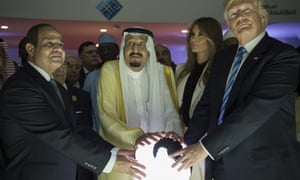Emboldened by renewed US support, Riyadh has moved quickly to demand its partners align their agendas to theirs
The Saudi dispute with Qatar is rooted in the region’s two biggest power plays. That a usually reluctant Riyadh would choose to open a highly public feud with the tiny Gulf state so soon after hosting Donald Trump and 40 other world leaders stems from a deliberate calculation within the ruling House of Saud that now is the time to consolidate its status.
Trump’s visit marked a return to business as usual for a bilateral relationship that had remained solid until Barack Obama’s second term. Until then, the US had underwritten the regional order for almost 70 years, assessing – contentiously – that the Saudi leadership had been a plank of regional stability. The pivot to Iran, which offered Tehran regional legitimacy in return for agreeing to wind back its nuclear programme, changed all that.
For three years, a troubled Riyadh felt as though its wings had been clipped. Unable to guarantee the backing of a superpower, it looked on as Iran made gains in Syria, Iraq and Lebanon while also reaching out to other allies such as Egypt – and Qatar
Successive US administrations had known what they were going to get with the Saudis and most of the Gulf. That has increasingly not been the case with Qatar. The former British protectorate, now the world’s wealthiest country per capita, had not played by the same rules, especially vis a vis its approach to Iran and the Muslim Brotherhood.
Riyadh and Abu Dhabi viewed both as subversive threats and its complaints about Qatar’s ongoing dealings had routinely been rebuffed. Doha had also dabbled with Israel, Hamas, al-Qaida and the Taliban, keeping a stake in many of the region’s troublespots – ostensibly to maintain relevance – while assuming a disproportionate clout that might act as a safeguard if cornered.

But now that Riyadh believes the correct order has been restored, it is demanding that its partners align their agendas to its own, particularly on Iran and the Muslim Brotherhood, but also in Egypt and Libya where Qatar’s role has often clashed with that of its powerful neighbours.
Opposition to the Muslim Brotherhood, in particular, had become an obsession for Saudi Arabia and its Gulf allies. Organised political Islam posed an irreconcilable threat to their regimes, they believed. An earlier attempt to bring Qatar’s emir into line, by briefly breaking ties in 2014, was thought to have been successful. But ever since, and especially while Riyadh played second fiddle during Obama’s presidency, Saudi leaders had stewed and waited for their moment.
The return to old ways – the US robustly denouncing Iran and expressing willingness to look the other way on Saudi humanitarian and governance issues – not to mention the ongoing accommodation between the kingdom’s Wahhabi clergy and its leaders, was to be set aside again. Saudi Arabia’s new legitimacy was met with palpable relief in Riyadh, where a licence to throw its weight around was always going to be quickly taken up.

The move was perhaps quicker than expected. When Qatar’s official news agency posted a speech by the emir criticising Saudi Arabia that officials said he had not made (and blamed on hackers), a propaganda machine kicked into action within an hour. Columnists, pundits and leaders lined up to denounce the Doha leadership for maintaining ties to Iran and the Brotherhood.
One Saudi official even invoked the jailed former Egyptian president Mohamed Morsi – a Brotherhood leader – suggesting Qatari officials could share the same fate.
The severing of land, sea and air access is more extensive and pointed than the schism of 2014, but is designed to carry the same message – that Qatar needs to fall into line with the rest of the Gulf by recognising similar threats and disavowing the same foes. The bottom line here is that Riyadh, emboldened by renewed US support and alarmed by the gains of Iran, is reclaiming the role of silverback.
Doha knows it has little room to move. It cannot afford to leave the Gulf Cooperation Council, which offers collaborative security and a trade bloc. It cannot afford to be isolated, but nor does it want to fold too quickly. Having spent decades building a brand as the state with a stake in everything, bowing to a master will starkly expose its limits.














